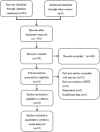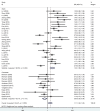An updated meta-analysis of 37 case-control studies on the association between NFKB1 -94ins/del ATTG promoter polymorphism and cancer susceptibility
- PMID: 27463002
- PMCID: PMC5295460
- DOI: 10.18632/oncotarget.10808
An updated meta-analysis of 37 case-control studies on the association between NFKB1 -94ins/del ATTG promoter polymorphism and cancer susceptibility
Abstract
As a cell survival signal, nuclear factor-kappa B (NFKB) is associated with the pathogenesis of numerous malignancies. According to several studies, NFKB1 -94ins/del ATTG promoter polymorphism is associated with the risk of different malignancies, but the results were not consistent. Therefore, we performed an updated meta-analysis based on 37 case-control studies from 33 articles (16,271 cases and 22,781 controls) to clarify the relationship. The odds ratio (OR) and 95% confidence interval (CI) were used to determine the strength of the association. We found that the NFKB1 -94ins/del ATTG promoter polymorphism was significantly associated with increased susceptibility to cancer in the recessive (II vs. ID+DD, OR = 1.140, 95% CI = 1.029-1.263, p =0.012), homozygote (II vs. DD, OR = 1.259, 95% CI = 1.068-1.485, p =0.006), and allele (I vs. D, OR = 1.109, 95% CI = 1.025-1.199, p =0.010) genetic models. The subgroup analysis for ethnicity found that the NFKB1 -94ins/del ATTG promoter polymorphism was significantly associated with an increased susceptibility to cancer in Asians and with a decreased susceptibility in Caucasians. The stratified analyses revealed significant associations between the polymorphism and increased susceptibility to ovarian cancer, oral squamous cell carcinoma, and nasopharyngeal carcinoma.
Keywords: NFKB1; cancer; meta-analysis; polymorphism.
Conflict of interest statement
CONFLICT OF INTERESTS Authors declare no financial disclosure or conflicts of interest.
Figures




Similar articles
-
Association between the NFKB1-94ins/del ATTG polymorphism and cancer risk: an updated meta-analysis.Cancer Invest. 2014 Aug;32(7):311-20. doi: 10.3109/07357907.2014.911881. Epub 2014 May 14. Cancer Invest. 2014. PMID: 24827594
-
Meta-analysis of studies on the association between the NF-κB1-94ins/del ATTG promoter polymorphism and cancer.Tumour Biol. 2014 Dec;35(12):11921-31. doi: 10.1007/s13277-014-2470-3. Epub 2014 Sep 5. Tumour Biol. 2014. PMID: 25190017
-
NFKB1 -94insertion/deletion ATTG polymorphism and cancer risk: Evidence from 50 case-control studies.Oncotarget. 2017 Feb 7;8(6):9806-9822. doi: 10.18632/oncotarget.14190. Oncotarget. 2017. PMID: 28039461 Free PMC article. Review.
-
Association of NFKB1 -94ins/delATTG promoter polymorphism with susceptibility to autoimmune and inflammatory diseases: a meta-analysis.Tissue Antigens. 2011 Jan;77(1):9-17. doi: 10.1111/j.1399-0039.2010.01559.x. Epub 2010 Sep 6. Tissue Antigens. 2011. PMID: 21155719
-
Association Between the NFKB1-94ins/del ATTG Polymorphism (rs28362491) and Coronary Artery Disease: A Systematic Review and Meta-Analysis.Genet Test Mol Biomarkers. 2016 Mar;20(3):105-11. doi: 10.1089/gtmb.2015.0242. Epub 2016 Jan 22. Genet Test Mol Biomarkers. 2016. PMID: 26799199
Cited by
-
The NFKB1 Promoter Polymorphism (-94ins/delATTG) Is Associated with Susceptibility to Cytomegalovirus Infection after Kidney Transplantation and Should Have Implications on CMV Prophylaxis Regimens.Cells. 2021 Feb 12;10(2):380. doi: 10.3390/cells10020380. Cells. 2021. PMID: 33673169 Free PMC article.
-
Genetic Association between NFKBIA and NFKB1 Gene Polymorphisms and the Susceptibility to Head and Neck Cancer: A Meta-Analysis.Dis Markers. 2019 Sep 12;2019:6523837. doi: 10.1155/2019/6523837. eCollection 2019. Dis Markers. 2019. PMID: 31612070 Free PMC article. Review.
-
Association of serum leptin with breast cancer: A meta-analysis.Medicine (Baltimore). 2019 Feb;98(5):e14094. doi: 10.1097/MD.0000000000014094. Medicine (Baltimore). 2019. PMID: 30702563 Free PMC article.
-
Gene Differential Expression and Interaction Networks Illustrate the Biomarkers and Molecular Biological Mechanisms of Unsaponifiable Matter in Kanglaite Injection for Pancreatic Ductal Adenocarcinoma.Biomed Res Int. 2022 Jun 6;2022:6229462. doi: 10.1155/2022/6229462. eCollection 2022. Biomed Res Int. 2022. Retraction in: Biomed Res Int. 2024 Jan 13;2024:9823163. doi: 10.1155/2024/9823163. PMID: 35707377 Free PMC article. Retracted.
References
-
- Pharoah PD, Dunning AM, Ponder BA. Association studies for finding cancer-susceptibility genetic variants. Nature Reviews Cancer. 2004;4:850–860. - PubMed
-
- Foulkes WD. Inherited susceptibility to common cancers. New England Journal of Medicine. 2008;359:2143–2153. - PubMed
-
- Sun XF, Zhang H. NFKB and NFKBI polymorphisms in relation to susceptibility of tumour and other diseases. Histology & Histopathology. 2007;22:1387–1398. - PubMed
-
- Sen R, Baltimore D. Multiple nuclear factors interact with the immunoglobulin enhancer sequences. Cell. 1986;46:705–716. - PubMed
-
- Sen R, Baltimore D. Inducibility of kappa immunoglobulin enhancer-binding protein Nf-kappa B by a posttranslational mechanism. Cell. 1986;47:921–928. - PubMed
Publication types
MeSH terms
Substances
LinkOut - more resources
Full Text Sources
Other Literature Sources
Medical
Molecular Biology Databases
Research Materials
Miscellaneous

